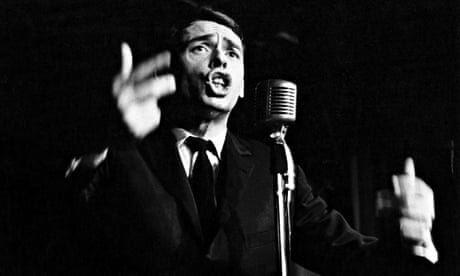I remember clearly when I first became aware of Jacques Brel's music – the day he died. It was October 1978 and I was on my year abroad as part of my languages degree. I had been busking in Aix-en-Provence and was hitchhiking back to Nice, where I was teaching in a secondary school. I got a lift with a Belgian lorry driver, a big guy, a chain-smoker, tattooed. He was listening to Belgian radio and the newsflash came on: Brel dead. They started playing his songs non-stop and the driver told me all about him. At one point, I looked over and realised he was crying.
At the time, I didn't really know who Brel was. I was living in a tiny studio flat and didn't have TV or radio, still less a record player. There was a jukebox in the canteen where I used to eat, but the only song I remember putting on is Ça Plane Pour Moi by this Belgian outfit called Plastic Bertrand. And I quite liked a cute female French pop singer called France Gall, too. I suspect Brel would spin in his grave if he heard me say that.
I started to buy his records. I realised there are just so many songs – my greatest hits box set has almost 200, almost all of high quality, of varying styles. He was prolific, despite the fact that he had a short career: only 20-odd years on stage and dead from lung cancer at 50. After performing on the cabaret circuit in Brussels and struggling to make his way, he left for Paris in 1953. He worked his way up, writing songs for other people and performing his own material. He was always on the move – an adventurer in every sense.
He retired from performing in 1967, and spent the last 10 years of his life in semi-retirement, buying a yacht and sailing it around with the last of many mistresses, Maddly Bamy. He's buried on one of the Marquesa islands in Polynesia, just across from the grave of Paul Gauguin.
I've got the collected works of Brel upstairs, all his lyrics – it's a big tome. When you read them, they're like poems, in the clarity of their ideas, the way they're expressed, the wit and cynicism, the plays on words. They can move you even without the music, although the music adds layer upon layer of emotion. Some of the songs are overwhelmingly romantic; at other times, he's just messing about, experimenting with feelings and words. I see him above all as a poet who wrote music and could sing with phenomenal passion. You can find lots of film of him on YouTube – it's like he's living the song, totally possessed by it. He wasn't a good-looking bloke – odd teeth, a face that didn't quite work, but on stage he was mesmeric. The records are great, but you have to see him perform live to get a sense of what a genius he was.
He didn't talk much when he was up there and never did encores, but at the last French concert he gave, at Olympia in Paris, the audience wouldn't let him go. He finished the concert and went down to his dressing room, but they simply refused to leave. The venue manager had to plead with him to go back on, which eventually he did, in his dressing gown.
When I did the Australian version of Desert Islands Discs a few years back, I asked if I could have 10 Brel songs. They said no, so in the end I had to just choose one. I went for Ne Me Quitte Pas (Don't Leave Me). It's so powerful: a man begging a woman to stay with him despite everything that's happened. "I will offer you pearls of rain from lands where rain never falls," he sings. You assume it's about his wife, but he actually wrote it for one of his mistresses.
My favourites change all the time, though. Amsterdam is extraordinary, and there's another called Les Flamandes – a funny and rude song about the Flemish and their terrible dancing. La Valse à Mille Temps and Au Printemps are works of art. Le Moribond is brilliant (Terry Jacks' Seasons in the Sun is a dreadful adaptation).
I've been listening to Brel for years now; every time we go to France on holiday, I find myself in markets, scouting for stuff. When I was working in Number 10, I'd listen to him while running to work, and I listen to him now when I'm cycling, though I know I shouldn't. He's always there somewhere. He'll be at my funeral, I'm sure. Again the list keeps changing, but right now it's between On N'oublie Rien and Quand On N'a Que L'amour. Maybe the latter – the title roughly translates as When Love Is All We Have. Not a bad message to go out on.
Brel en bref
Life: Born 8 April 1929; died 9 October 1978.
Way in: Amsterdam, all that musicality and passion.
For aficionados: L'Oeuvre Intégrale, the book of all Brel's lyrics (1998). It's addictive.
In three words: Meilleur du monde.

Comments (…)
Sign in or create your Guardian account to join the discussion